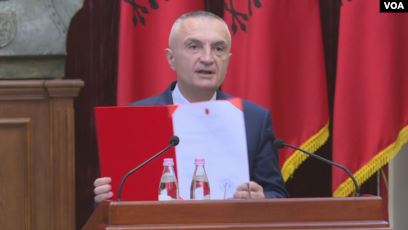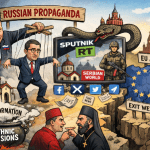TIRANA, Jan. 13 – Albanian President Ilir Meta returned to the Parliament the latest amendments to the two laws “on audiovisual media” and “on electronic communications”.
Regarding the first law, Meta considers that it contradicts the basic constitutional principles of building a democratic state, legal security and proportionality.
In addition, the law, according to him, contradicts the constitutional provisions protecting the right to freedom of expression, freedom of the press and the right to information, which contradict the jurisprudence of the Constitutional Court of the Republic of Albania, whose decisions constitute mandatory norms for implementation, and is not in line with the standards of the European Convention on Human Rights.
Meta said that the adoption of these provisions essentially contains direct censorship elements that limit the right to freedom of expression and the media.
“This state of censorship is created through the application of disproportionate punitive measures that these provisions provide, measures that can be assessed and imposed by administrative bodies, which in open opposition to constitutional and legal order, are empowered to impose immediate execution of these measures, before there is a final decision on their legality,” emphasized Meta.
According to him, the entry into force of these changes will create an arbitrary and uncertain environment for electronic media operators. The government has every opportunity to use this legal basis to unfairly punish any media that does not fit the political will of the majority.
“This reality would produce intimidation and self-censorship, the unlawful closure or suspension of electronic media, directly affecting the quality and objectivity of information, which would provide the public with facts other than reality that not only mislead society in pursuit of their rights, but also in fulfilling civic responsibilities for building and maintaining democracy itself,” said Meta.
Such a situation, according to him, would place the country on the border of authoritarianism, which would pose a threat to Albania’s future and integration, as well as the existence of a functioning democracy in the country. Through the punitive mechanisms and decision-making bodies that can impose these punitive sanctions, political operators can come under political control, especially electronic media, which would constitute a serious violation of the right to expression and information.
While regarding the changes in the law “On electronic communications” Meta expressed concern about AKEP’s excessive punitive power over the media.
“Delegating by law to an administrative body of powers that the Constitution does not allow, the lack of transparency in decision-making procedure, and the application of disproportionate sanctions and without going through judicial review, is not in the balance between the public interest in protecting from false news and information, and the right to information, freedom of expression and the development of economic activity in the field of electronic publications,” Meta said.
He added that Prime Minister Edi Rama has stated in parliament that these legal changes are 100 percent agreed with the OSCE, but Harlem Desir, a media spokesman for the organization, has said no full agreement has ever been reached and has been cooperating for a long time to bring the project closer to international standards. While the head of the OSCE’s media office in Albania, Irina Radu, said during parliamentary hearings that “the OSCE thinks that the AMA has a wide range of powers to punish the media, as well as the extent of the fines imposed on journalists and the media. higher. It also has to be clear what political criticism is and what slander it is. ”
The European Union, the Council of Europe and the UNDP called for a revision of the third version of the draft laws, or the resumption of work on laws that have an impact on the media. The European Union has stated that the anti-discrimination package is not in line with European standards and requirements for media freedom and should be based on the principle of self-regulation of the media.










